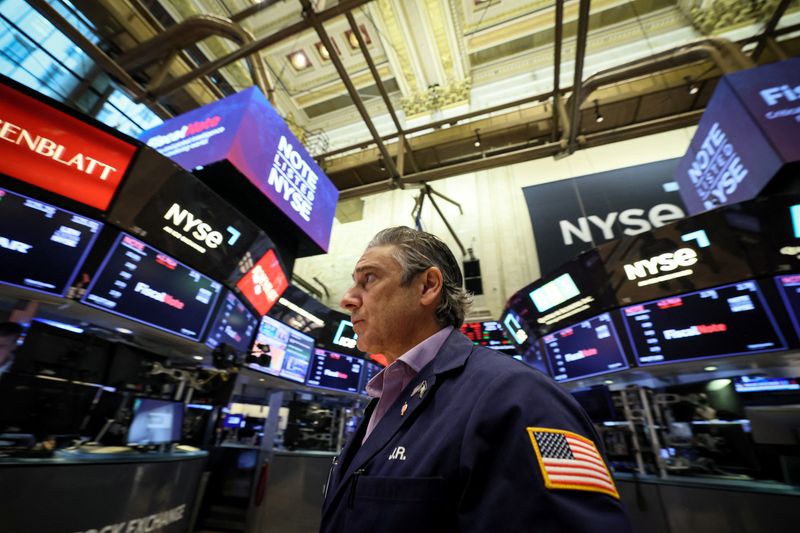By Lewis Krauskopf
NEW YORK (Reuters) - The end of the Federal Reserve's rate hiking cycle has generally been a good time to own U.S. stocks, but an uncertain economic outlook and stretched valuations could dampen upside this time around.
After raising borrowing costs by 525 basis points since March 2022, the U.S. central bank is widely expected to keep rates unchanged at the conclusion of its meeting next week. Many investors believe that policymakers are unlikely to raise rates any further, bringing an end to the central bank's most aggressive monetary policy tightening cycle in decades.
If they are right, stocks could be poised for more gains. After the Fed's past six periods of credit tightening, the S&P 500 rose an average of 13% from the final rate hike to the first cut in the following cycle, an analysis by financial research firm CFRA showed.
Investors with a more bearish view, however, say it is only a matter of time before higher rates tighten economic conditions and bring a downturn. The S&P 500 is already up over 16% this year, aided in part by a U.S. economy that has stayed resilient in the face of higher interest rates.
"The market will probably cheer it a bit if it is the end of the Fed rate hike cycle," said Brent Schutte, chief investment officer at Northwestern Mutual Wealth Management Company.
However, "I don't think the economy is going to stay out of a recession and that is going to be what ultimately decides the direction of stocks," said Schutte, whose firm favors fixed income over equities.
Though most investors believe a recession is unlikely in 2023, a slowdown next year remains a possibility for some market participants. One worrying recession signal has been the inverted Treasury yield curve, a market phenomenon that has preceded past downturns.
The Fed will give its policy statement on Wednesday, with odds at 97% that it will keep rates unchanged, according to the CME FedWatch Tool, which tracks bets on futures tied to the central bank's policy rate. Traders see a roughly two-out-of three chance of the Fed leaving rates unchanged in November, CME's data showed.
Odds for December show about a 60% chance rates of rates staying at current levels.
PEAK RATES?
Fed Chair Jerome Powell said last month that the central bank may need to raise rates further to cool inflation, promising to move carefully at upcoming meetings.
More of the kind of generally benign inflation data that has come over the last few months, however, could mean the Fed's quarter-point increase in July was the last in a cycle that shook asset prices last year.
"If Wall Street comes to the conclusion that the Fed has ended its rate tightening program, that would at least offer support if not give (stocks) an additional catalyst to keep working higher," said Sam Stovall, CFRA's chief investment strategist.
Investors are also attempting to gauge when the Fed will begin easing monetary policy. CFRA found that the Fed has tended to cut rates an average of nine months after its last rate increase, with the S&P 500 gaining an average of 6.5% in the six months following the cut.
Investors are pricing in a small chance of a cut as early as the Fed's January meeting, with expectations of a cut at about 35% for May, according to the CME data.
Some investors, however, see challenges for the stock market even if the Fed is done hiking.
Analysts at Oxford Economics forecast further downside for global earnings, noting that stocks "have typically delivered far weaker returns following the final Fed rate hike when it has coincided with an EPS downturn."

Oxford and other investors are also wary of stock valuations, which have ballooned this year. The S&P 500 is trading at about 19 times forward 12-month earnings estimates versus 17 times at the start of the year and its long-term average of 15.6 times, according to LSEG Datastream.
Equity valuations are also threatened by the rise in bond yields, which has increased the attraction of fixed income as investment alternative to stocks. The yield on the 10-year Treasury is close to over 15-year highs. "If (the Fed) came out and said 'we're done,' yeah I do think that is probably cause for some celebration," said Jack Ablin, chief investment officer at Cresset Capital. "But I'm not sure how sustainable it would be given where stocks are valued relative to bonds already."